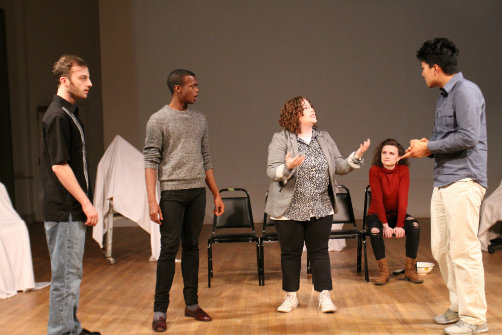A PLAY ABOUT DREW CAREY
Written by Philip Santos Schaffer; Directed by Stefanie Harris
Presented by WalkUpArts
Off Off Broadway, Play
Ran through 12.14.16
University Settlement’s Speyer Hall, 184 Eldridge Street
by Emily Cordes on 12.19.16

Photo by Charlotte Arnoux.
BOTTOM LINE: Blending improv comedy and poignant scenework, A PLAY ABOUT DREW CAREY explores humor’s deeper role in our lives.
In any given society, comedians function as both entertainers and truth-tellers: from Shakespeare to Saturday Night Live, humor forms a platform through which we may safely articulate, diffuse, and unpack complex personal and collective issues. Inspired by playwright Philip Santos Schaffer’s own experiences and the work of his favorite comedian, A PLAY ABOUT DREW CAREY highlights this concept, using Drew Carey’s iconic sketch comedy style to reveal deeper truths about the human search for meaning and connection.
The show quickly establishes the link between humor and humanity, imagining a conversation between a fictionalized Schaffer (Ryan Molloy, simply known as “Me”) and Drew Carey (Aaren Lasky) at the height of his career. The popularity of Carey’s work, we learn, rests in its simple democracy. Midwestern, middle-class, comfortable but always vaguely dissatisfied, The Drew Carey Show’s characters epitomized America’s turn-of-the-twentieth-century everyman. Likewise, Whose Line Is It Anyway?, with its improvised silliness, live audience, and arbitrary scoring system, celebrated friendship and community; at its core, it brought people together to laugh. The perfect comic scenario, Carey proposes, should be similarly egalitarian, a place in which personal boundaries dissolve, no one feels ostracized, and everyone is in on the joke. While this idyllic condition can only last so long in the face of human ego and greed, it is ideal for which all artists strive—and one which, Schaffer reveals, fuels him when the pursuit of a creative career seems trivial or pointless.
A PLAY ABOUT DREW CAREY generates this camaraderie by including its audience in a live Whose Line show, featuring such familiar improv games as “Scenes From A Hat,” “Song Styles,” and the infamous “Hoedown.” The show’s programs include several slips of blank paper, on which participants are directed to write scene prompts, music or film genres, and lines of dialogue to inform the sketches. As several of DREW CAREY’s actors boast backgrounds in improv, their timing and versatility keep us steadily laughing as they bring our suggestions to life. Further keeping with the show’s inclusivity, the performers guide us as much as we do them, inviting audience members to share our favorite jokes or write poems for the person seated next to us. Hallie Samuels’ clown sequences supplement DREW CAREY’s comic throughline; while it’s unclear whether her presence is meant as a reference to The Drew Carey Show’s heavily made-up Mimi, Samuels’ slapstick is unmatched and offers another widely appealing comic element. A lone “Studio Audience” member (Rita McCann) also unites performers and spectators, crossing from stage to seats as she fires up the crowd, laughs at Carey from her onstage living room, or gets roped into Samuels’ antics.
Just as lighthearted comedy often couches more serious issues, DREW CAREY intercuts its sketch sequences with scenes and monologues revealing the show’s darker, sadder underbelly. Canadian Colin Mochrie (Anthony Gabriele)’s obsession with Whose Line’s meaningless points belies a yearning to prove his worth to American audiences. Wayne Brady (Isaiah Stanley) stifles his frustration with the show’s racial politics while finding joy in song collaborations with pianist Laura Hall (Matt Engle). Even the “Helping Hands” sequence's silly prop comedy takes a dimmer tone as Ryan Stiles (Donald Chang) balks at its wanton waste of food.
While DREW CAREY makes clear its stance on laughter as a unifying, healing force, its running social commentary can come across as heavy-handed and a little unfocused; the show’s comic bits are strong enough to support its claims without the need for constant reiteration. Schaffer is, however, self-aware enough to acknowledge this, and occasionally pokes fun at his own over-zealousness. Philosophical weight notwithstanding, DREW CAREY lives up to its ideals, allowing strangers to bond over simple-yet-satisfying comedic fare. In an increasingly divisive, scary world, the act of laughing with others is not only comforting but radical: maybe, as Schaffer posits, if it happened more often, “we wouldn’t be able to kill each other anymore.”
(A PLAY ABOUT DREW CAREY played at University Settlement’s Speyer Hall, 184 Eldridge Street, through December 14, 2016. Tickets were $18. For more information visit walkuparts.org.)
A PLAY ABOUT DREW CAREY is written by Philip Santos Schaffer and directed by Stefanie Harris. Presented by WalkUpArts. Produced by Audrey Frischman and Matt Engle.
The cast is Ryan Molloy, Aaren Lasky, Hallie Samuels, Anthony Gabrielle, Donald Chang, Isaiah Stanley, Matt Engle, Eliza Hill, and Rita McCann.

